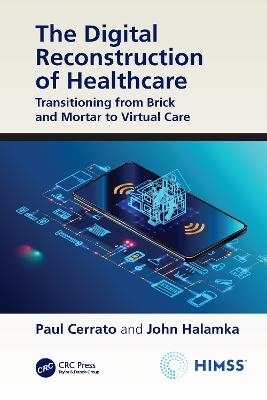
The Digital Reconstruction of Healthcare
Taylor & Francis Ltd (Verlag)
978-1-032-01513-2 (ISBN)
- Lieferbar (Termin unbekannt)
- Versandkostenfrei innerhalb Deutschlands
- Auch auf Rechnung
- Verfügbarkeit in der Filiale vor Ort prüfen
- Artikel merken
The complex challenges facing healthcare require innovative solutions that can make patient care more effective, easily available, and affordable. One such solution is the digital reconstruction of medicine that transitions much of patient care from hospitals, clinics, and offices to a variety of virtual settings. This reconstruction involves telemedicine, hospital-at-home services, mobile apps, remote sensing devices, clinical data analytics, and other cutting-edge technologies. The Digital Reconstruction of Healthcare: Transitioning from Brick and Mortar to Virtual Care takes a deep dive into these tools and how they can transform medicine to meet the unique needs of patients across the globe.
This book enables readers to peer into the very near future and prepare them for the opportunities afforded by the digital shift in healthcare. It is also a wake-up call to readers who are less than enthusiastic about these digital tools and helps them to realize the cost of ignoring these tools. It is written for a wide range of medical professionals including:
Physicians, nurses, and entrepreneurs who want to understand how to use or develop digital products and services
IT managers who need to fold these tools into existing computer networks at hospitals, clinics, and medical offices
Healthcare executives who decide how to invest in these platforms and products
Insurers who need to stay current on the latest trends and the evidence to support their cost effectiveness
Filled with insights from international experts, this book also features Dr. John Halamka’s lessons learned from years of international consulting with government officials on digital health. It also taps into senior research analyst Paul Cerrato’s expertise in AI, data analytics, and machine learning. Combining these lessons learned with an in-depth analysis of clinical informatics research, this book aims to separate hyped AI "solutions" from evidence-based digital tools. Together, these two pillars support the contention that these technologies can, in fact, help solve many of the seemingly intractable problems facing healthcare providers and patients.
Paul Cerrato, MA, is a senior research analyst at the Mayo Clinic. He has more than 30 years of experience working in healthcare as a medical journalist, research analyst, clinician, and educator. He has written extensively on clinical medicine, clinical decision support, electronic health records, protected health information security, and practice management. He has served as the Editor of InformationWeek Healthcare, Executive Editor of Contemporary OB/GYN, Senior Editor of RN Magazine, and contributing writer/editor for the Yale University School of Medicine, the American Academy of Pediatrics, InformationWeek, Medscape, Healthcare Finance News, IMedicalapps.com, and MedpageToday. The Health Information Management Systems Society (HIMSS) has listed Mr. Cerrato as one of the most influential columnists in healthcare IT. He has served as a guest lecturer or faculty member at the Columbia University College of Physicians and Surgeons, Harvard Medical School, and Vermont College. Among his achievements are 6 editorial awards from the American Business Media—often referred to as the Pulitzer Prize of business journalism—and the Gold Award from the American Society of Healthcare Publications Editors for best signed editorial. John D. Halamka, MD, MS, president of the Mayo Clinic Platform, leads a portfolio of new digital platform businesses focused on transforming health by leveraging artificial intelligence, machine learning, and an ecosystem of partners for the Mayo Clinic. He is a practicing emergency medicine physician. Previously, Dr. Halamka was executive director of the Health Technology Exploration Center for Beth Israel Lahey Health in Massachusetts. Previously, he was chief information officer at Beth Israel Deaconess Medical Center for more than 20 years. In addition, he was the International Healthcare Innovation Professor at Harvard Medical School. As the leader for innovation at the $7 billion Beth Israel Lahey Health, he oversaw digital health relationships with industry, academia, and government worldwide. As a Harvard Medical School professor, he served the George W. Bush administration, the Obama administration, and governments around the world planning their health care information (IT) strategies. In his role at Beth Israel Deaconess Medical Center, Dr. Halamka was responsible for all clinical, financial, administrative, and academic IT.
1. Is Digital Transformation Necessary?. 2. The Impact of Digital Health on COVID 19. 3. The Merits and Limitations of Telemedicine, Hospital at Home, and Remote Patient Monitoring. 4. Entering the Age of Big Data- and AI-Assisted Medicine. 5. The Machine Learning/AI Toolbox. 6. The Transformative Impact of Voice and Related Conversational Technologies. 7. Cybersecurity: Securing the Future of Digital Health. 8. How Will the Digital Reconstruction of Healthcare Play out across the Globe?
| Erscheinungsdatum | 09.06.2021 |
|---|---|
| Reihe/Serie | HIMSS Book Series |
| Zusatzinfo | 12 Line drawings, color; 12 Illustrations, color |
| Verlagsort | London |
| Sprache | englisch |
| Maße | 156 x 234 mm |
| Gewicht | 440 g |
| Themenwelt | Mathematik / Informatik ► Informatik ► Netzwerke |
| Informatik ► Theorie / Studium ► Künstliche Intelligenz / Robotik | |
| Wirtschaft ► Volkswirtschaftslehre | |
| ISBN-10 | 1-032-01513-6 / 1032015136 |
| ISBN-13 | 978-1-032-01513-2 / 9781032015132 |
| Zustand | Neuware |
| Haben Sie eine Frage zum Produkt? |
aus dem Bereich


